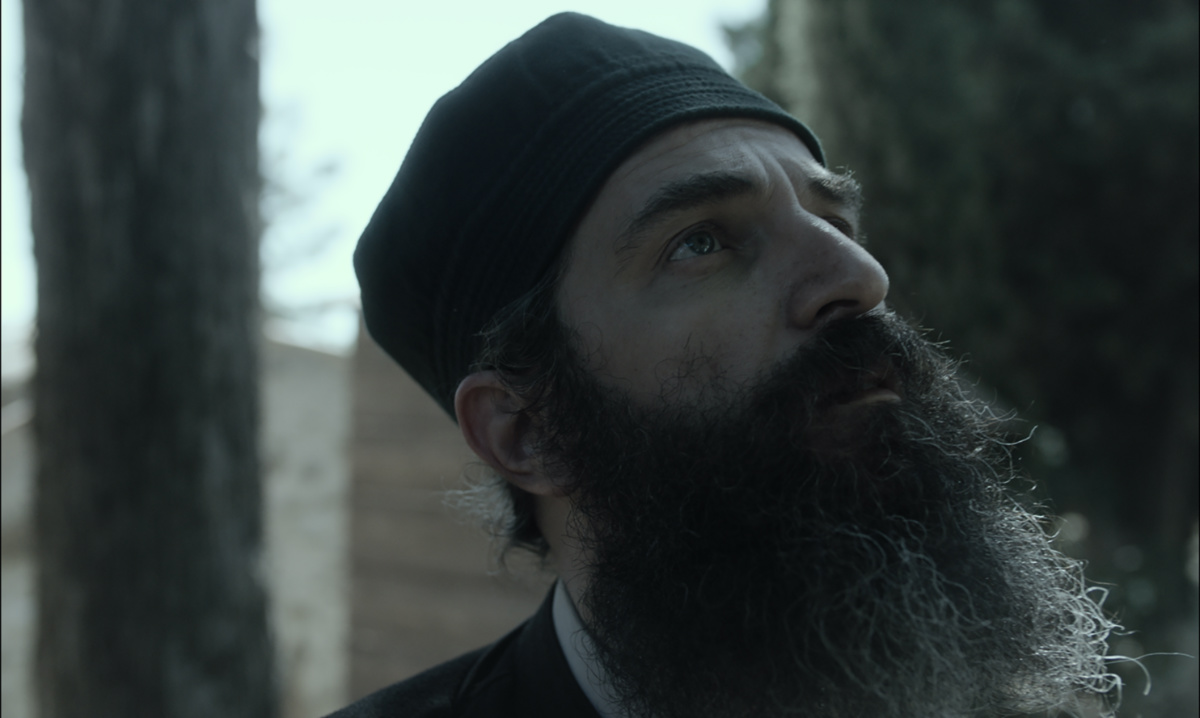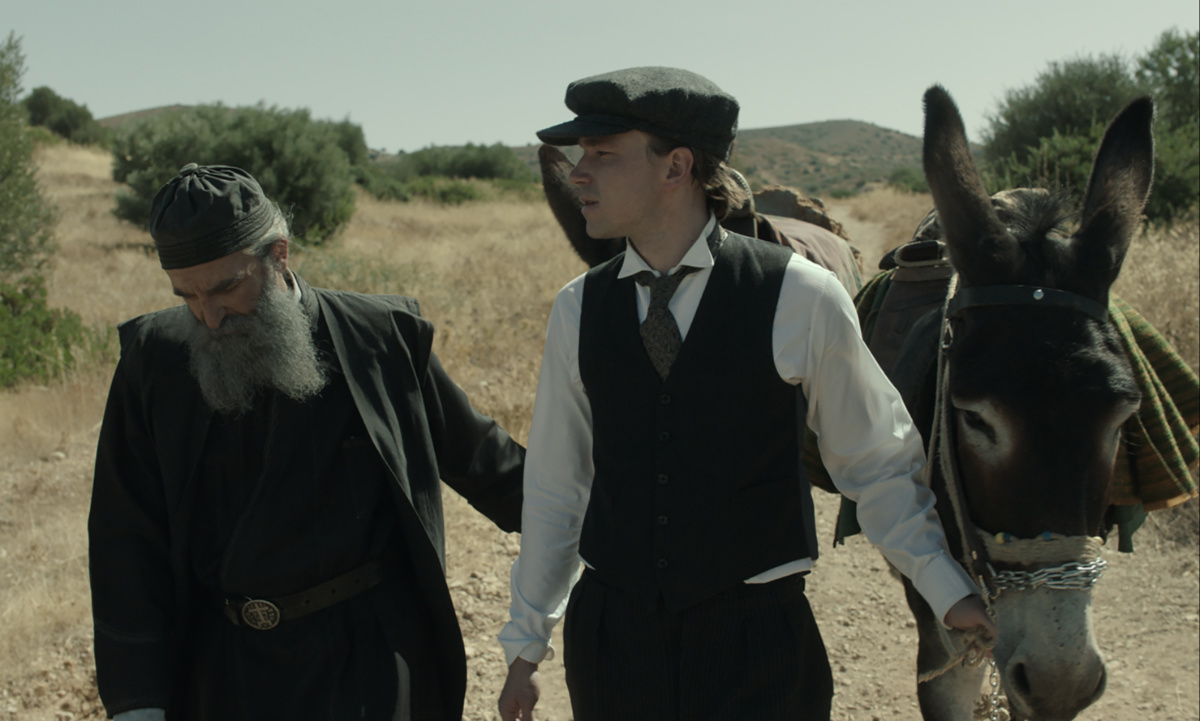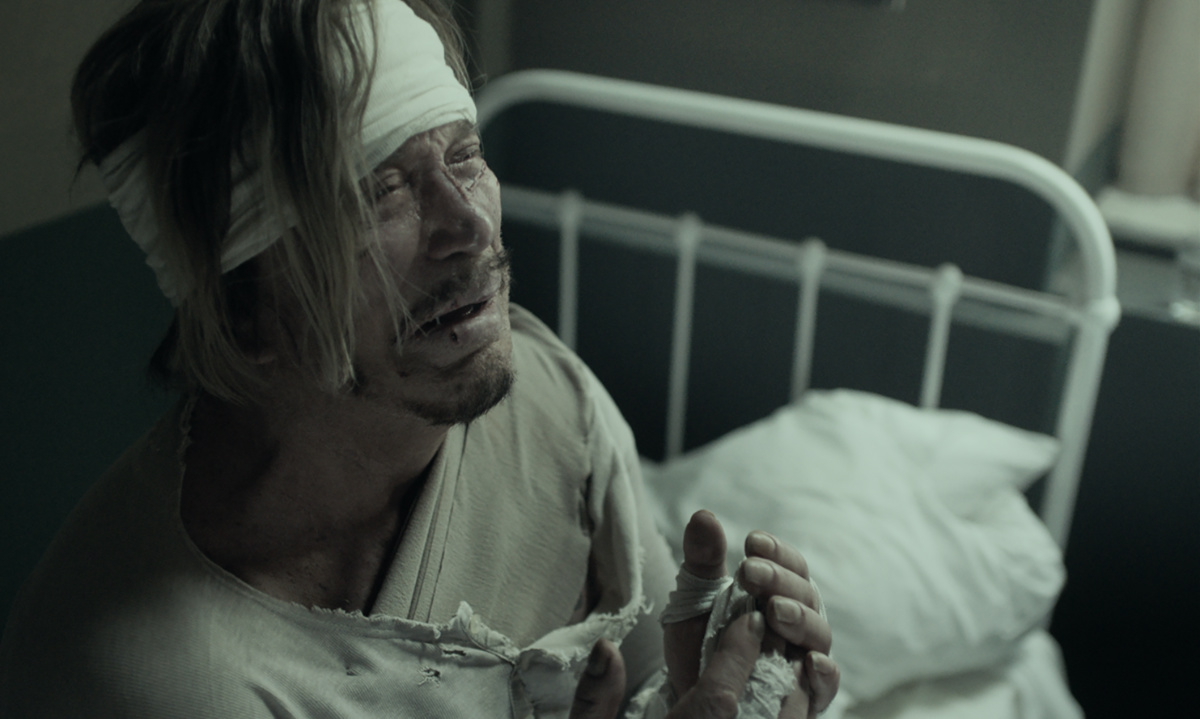
DAVID ADAMS speaks with Yelena Popovic, director of ‘Man of God’ about why she made the film, whom she hopes will see it and what message St Nektarios of Aegina’s life has for us today…
Geelong, Australia
While film-maker Yelena Popovic – director of Man of God, a film about the life of Orthodox saint Nektarios of Aegina – says her Orthodox faith has played “a big part in my life”, she had never thought about making a film about a saint. Not until, that is, she visited Serbia in 2012 to attend a memorial for her father who passed away the previous year and while there visited a bookstore in Belgrade where she spotted a book about St Nektarios.
“I’d heard about him, of course,” she says, speaking to Sight from Greece. “I remember I’d heard about him in Arizona – I was living in Los Angeles and I’d often go to this monastery, St Anthony the Great in Arizona. Quite a few people told me ‘Oh, have you ever heard about St Nektarios, he’s incredible, you should read about him.’ So when I saw a book about him, that was a perfect moment. I purchased the book thinking ‘Perfect, now I am going to read about him [after] I’d heard about him, because it’s a long trip back to Los Angeles.”

Aris Servetalis plays St Nektarios in Man of God.
St Nektarios’ life, as depicted in the film, was one characterised by his perserverance amid persecution and suffering along with his love for the downtrodden. Made a Metropolitan bishop in the Greek Orthodox Church in 1889, he subsequently endured being defrocked and expelled from where he was ministering in Alexandria after his popularity among the people provoked the jealously of other clergy. Returning to Greece, Nektarios was shunned by church authorities and spent his time continuing to minister among the poor and marginalised before eventually he was able to obtain a role as the head of a school for priests in Athens.
Nektarios, who also wrote numerous books, went on to found a monastery for women on the isle of Aegina and again faced the ire of church officials for doing so. He eventually withdrew there to live out the remainder of his life as a monk, his ministry to others continuing even as he was himself facing illness in the final days before his death in November, 1920. Nektarios was officially recognised as a saint by the Ecumenical Patriarchate of Constantinople in 1961.
“St Nektarios’ life was one of unjust prosecution; he was somebody who…was unjustly slandered…He was a priest of his people, he was somebody who really lived what he preached.”
Popovic recalls how St Nektarios’ story impacted her as she read it on the plane, particularly because of the parallels she drew between his life and that of her father who was very much in her thoughts at the time.
While her father wasn’t religious, Popovic – who wasn’t able to attend his funeral in 2011 because of her immigration status in the US (she’s now an American citizen), describes her father as a “righteous man, an honourable man” who wasn’t willing to do anything unethical to further his career. Working as a civil engineer in what was then Yugoslavia he became what she terms “a thorn in the side of those in power”, a position which ultimately cost him his job and saw him then working in a much lowlier position.
“He was a very humble man and I remember him being always criticised for that…by his family and people around him – that…maybe he didn’t have to be so righteous and honest,” recalls Popovic, who she says she remembers admiring her father for those same qualities.
“[W]hen I read that book…it really struck a chord. St Nektarios’ life was one of unjust prosecution; he was somebody who…was unjustly slandered…He was a priest of his people, he was somebody who really lived what he preached.”
“I was amazed at his humility, at his ability to forgive, to surrender his life to Christ and to basically imitate Christ’s life and to take his cross and follow Jesus by what he did. I felt it was a great story to tell and something that I had a lot of personal understanding for on so many levels. And that’s when I felt that I had to embark upon this journey…”

Aris Servetalis as Nektarios with Alexander Petrovas his friend and assistant Kostas in a scene from Man of God.
Man of God, which is released in Australia and New Zealand this week following its release in Greece in 2021 and in the US earlier this year, stars Greek actor Aris Servetalis as Nektarios with Russian actor Alexander Petrov playing his friend and assistant Kostas. Hollywood stalwart Mickey Rourke makes an appearance in a few scenes towards the film’s end (more about that in a moment).
Popovic, who also wrote and co-produced the film, says she wanted to make Man of God – which was shot in Athens and on the isle of Aegina – “as human as possible” especially because of its religious theme.
“I wanted to make it as human and honest as possible so that anybody can watch this film,” she says. “Obviously the main audience will be the faith-based audience – that’s the audience that I believe that is looking for films…like these. But also, it has the potential to cross over into mainstream because, as I’ve seen so far with people that are not…religious, they are really pleased that they have seen the movie. It seems to have a healing effect; it helps people in times of trouble or difficulties. Because, one way or another, we all have suffering, we can’t avoid suffering in this world and it’s how we deal with it that ultimately determines how we are going to get through this life.”
We rely on our readers to fund Sight's work - become a financial supporter today!
For more information, head to our Subscriber's page.
In a reflection of the film’s themes, Man of God is a slowly paced film and features a saturated colour palette.
“His story is not a pretty story – it’s a beautiful story because it’s inspiring and gives one hope – but his life was not easy, it was very difficult.”
Popovic says the film was also made in a narrower aspect ratio than would typically be the case because “I didn’t want people to focus so much on the surroundings and watch it from the outside”.
“I wanted to bring the audience into the mind of this man because how else are they going to relate to him? I just wanted the audience to relate to him – to his life, to his suffering, to the things he has gone through.”
Popovic believes that the life of St Nektarios has something to speak into the lives of people today, just as they did during his own lifetime.
“I think so – today even more. Because today we live in a world where humility is completely forgotten, maybe even perceived as weakness. We live in a society where…no-one’s taking responsibility for anything – it’s always someone else’s fault and that seems to be the predominant teaching in the society: that you have to just believe in yourself and it’s never your fault. Well, what happens is that instead of becoming strong, you become extremely weak actually…[because] when you lose humility, you lose the ability to get close to God and you lose the ability to then gain that peace that Christ has given us…”
Mickey Rourke, a star of Hollywood films including 9½ Weeks, Barfly, Year of the Dragon and The Wrestler who has also had a professional boxing career and whose behaviour on and off set has at times been fodder for the tabloids, makes an appearance toward the end of the film where he plays a paralysed man.
Popovic says she “went after” Rourke for the role, in part because of his strong personal faith and the depth he could bring to the character.
“He had all the elements that were right for this role,” she says. “You needed somebody…to be extremely believeable in this particular role. It’s him at his best I think, even though it’s not too many scenes.”

Mickey Rourke who plays a paralysed man in Man of God.
Popovic says that ensuring the film was an accurate reflection of St Nektarios’ life was a “huge responsibility” given the esteem with which he is held among many people of the Orthodox faith, particularly within the Greek Orthodox community.
“I wouldn’t have dared entered this arena if I didn’t have that personal understanding of the story,” she says, adding that there was a real “love on the set”. “[T]he majority of people were really doing it because they believed in this project so there was this really good energy.”
That authenticity was put to the test in January, 2021, when the film was shown to 150 monks living in a Greek Orthodox monastery in Mount Athos (the monastery was a partner in the production of the film).
“If I can pass that test – having the film shown at Mount Athos in Greece; if they’re OK with it, that means I’m OK, I didn’t do something crazy. So, yes, they really loved it and that was very beautiful and I felt more confident after that.”
The film would go on to became the most watched movie in Greece during 2021.
“He was the people’s priest and the people loved the film, so it kind of goes together.”
As for what’s next, Popovic says she’d like to make a film about the life of third century Ethiopian saint St Moses.
“That’s something that’s in development,” she says. “I would like to make a film about that…That’s a great story of repentance – [he’s] a murderer and robber, a gang member who basically [repented] and became a martyr.”
‘Man of God’ is released in select cinemas in Australia and New Zealand on 2nd June. For a list of participating cinemas, head to www.movieschangepeople.com/in-cinemas/man-of-god.





